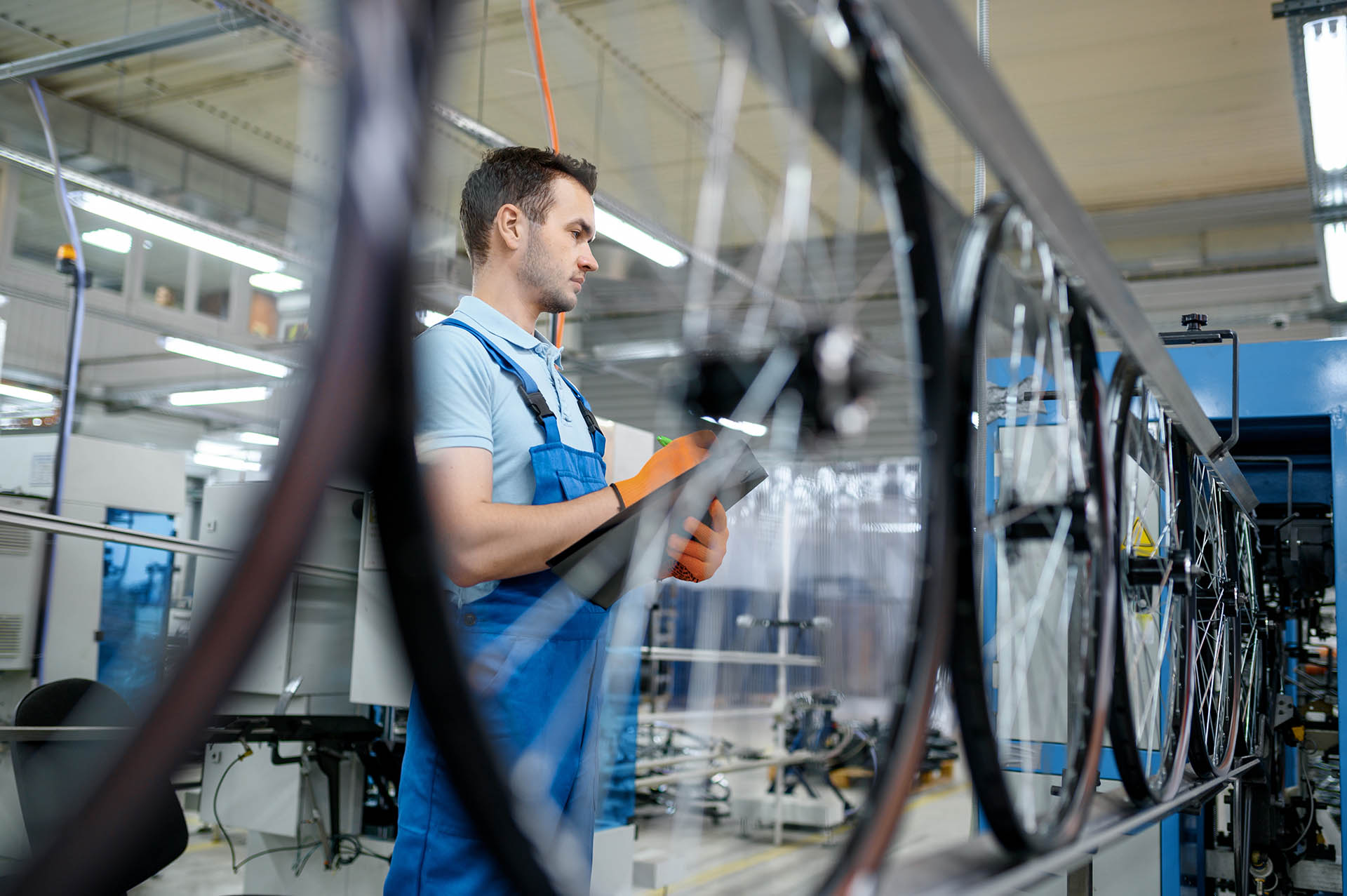Aiding inclusivity with innovative production lines for bicycle assembly
Akkodis is helping to transform bicycle assembly, with a ground-breaking production line. Launched in 2021, this project has resulted in an assembly plant where every employee can remain at their post and work efficiently.
5 minutes
15th of December, 2023

Traditionally, each employee “follows” the bicycle they are making from start to finish. Yet this standard production flow is no longer possible when the manufacturer employs disabled staff. People suffering from psychological trauma (following an accident, for example) find it difficult to cope with a variety of tasks. They can find change unsettling and prefer repetitive work instead. Physical disabilities, on the other hand, can limit the range of tasks a person can perform, so their workstation needs to be adapted. This may include anti-fatigue stools, lightweight accessories or adapted seating.
An unprecedented approach to assembly
In November 2021, the Akkodis Industrial Design Office in Nantes received a request from their client, who is part of the leading national network of sheltered employment. The challenge? To help overcome the shortage of bicycle manufacturing capacity in France and develop a complete assembly line for all types of bicycles, entirely operated by people with disabilities. Rising to the challenge, Akkodis designed a completely new assembly process unprecedented in Europe. Instead of following “their” bike and adding all the necessary parts, employees can remain at their workstations to mount a specific component.
Full client support for the production line
Initially, the project involved producing 200,000 bicycles a year. With such a large-scale production facility in mind, Akkodis began looking for a suitable site, and carried out an initial feasibility study on a 54,000 ft² (5,000 m²) building.
Akkodis also worked with the client to develop the future assembly line with the help of a partner company specializing in this field. Thierry Creach, project manager and head of the Akkodis Industrial Design Office in Nantes, explains: “Creating an assembly line is relatively straightforward. It is essentially a conveyor belt that moves a bicycle from one station to another. The main challenge was to adapt the production line and the preparation workstations to the needs of disabled staff. Thanks to the support we received from both our client and the partner company, we were able to better target these specific technical issues.”
The Akkodis team conducted a detailed logistical analysis and studied the production flows. They had to consider how to supply the components to the bike throughout the assembly until it leaves the production line for storage. Using their industrial experience, Thierry and his team designed the production process down to the smallest detail. They planned everything. From the type of transport equipment needed to supply the spare parts and the size of the access lanes allowing a forklift or rack to pass through, down to the number of workstations required and the assembly time for each type of bike.
They even produced a 3D model in the CAD tool Catia to help the client visualize the plant’s design. This model proved all the more relevant when the initial choice of site fell through due to budgetary constraints. Akkodis provided support in this transition, and proposed solutions for extending and adapting one of the client's existing industrial sites. Thanks to their precise design and flexibility in the face of budgetary uncertainties, Akkodis won the client’s complete confidence. The Nantes office was effectively given a free hand when it came to choosing suppliers, managing the factory layout and the overall implementation.
The electric trike factory for the 2024 Olympics
The project has undergone an impressive transformation since it began in 2021. From the initial plan to produce 200,000 bicycles, it evolved to a more compact facility capable of housing an 80,000-unit production line. To accommodate this change, Akkodis teams completed simulations to optimize flows, preparation station layouts, production line stages, and storage areas for raw materials and finished products.
Akkodis was also instrumental in setting up new electrical and pneumatic energy networks. These supply the preparation and production stations and replaced the existing defective networks. Another exciting new development involves the installation of four assembly stations for electric trikes made suitable for all users, including people with disabilities. Thanks to an adapted platform, these electrically assisted models allow users to get on the trike directly with their wheelchair. The client hopes to submit 15 of these e-trikes at the 2024 Paralympic Games in Paris.
The resounding success of this project has paved the way for new opportunities. The client asked Akkodis to work on quality issues and the development of chemical recycling standards. In addition, other clients are calling on its expertise to set up new production lines.
With the ambitious goal of showcasing e-trikes at the Paralympic Games, this project is a perfect example of how innovation and commitment to diversity can transform both our businesses and our communities.
Inspired by projects like this? We have positions that will see you enhance your skills, work on innovative projects and make a real impact. To find out more about our exceptional career opportunities, visit our Careers page.